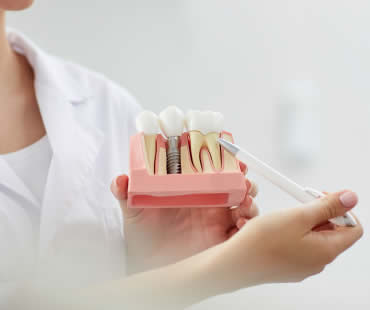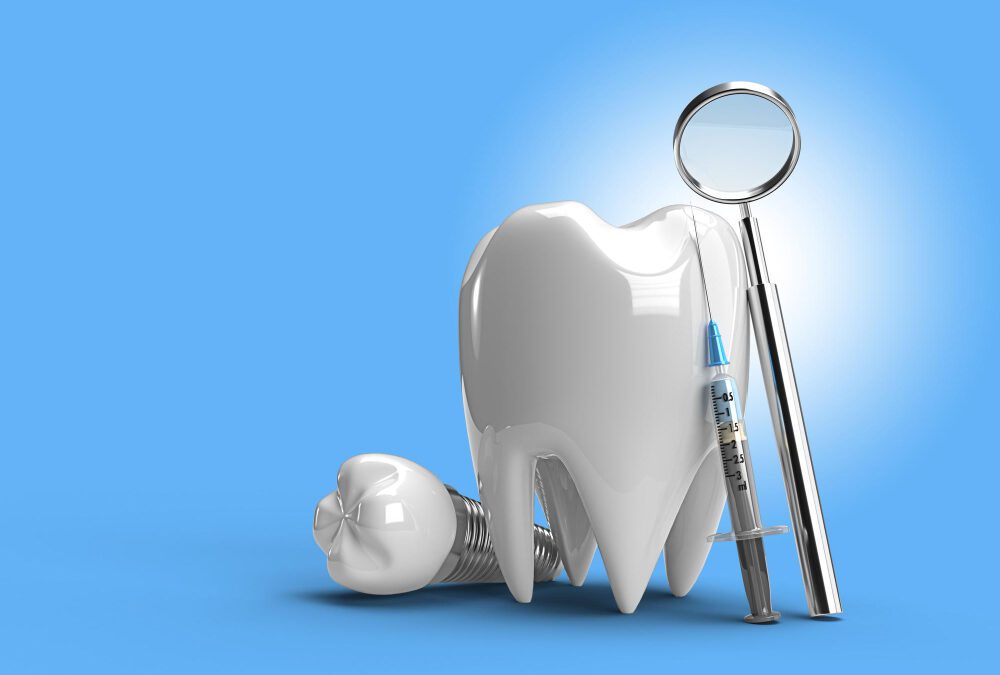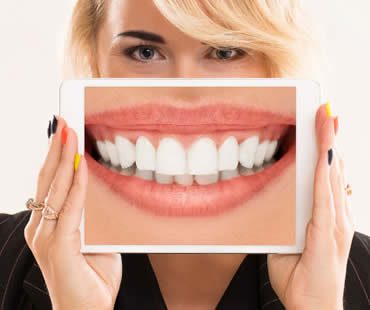
Jan 18, 2024 | Blog, Dental Topics 3, Implant Dentistry
Treatment with dental implants has proven to be highly predictable, with success rates in the range of 95%. However, if you are considering the placement of dental implants, you may still want reassurance about the safety of implants and the surgical procedure.
Dental implants are utilized to replace missing or damaged teeth. The implant acts in place of the natural root and supports restorations such as crowns, bridges, or removable dentures. Once implants have been placed, the patient enjoys the benefit of an appliance that looks and feels like natural teeth. Dental implant surgery is performed with the patient under local or IV sedation. The implant takes approximately four to six months to fuse to the jawbone, at which time your permanent restorations can be put into place.
We offer Dental Implants in Bingham Farms
In the past implants have been known to shrink the bone surrounding the implants over the course of time. However, newer implant technology has eliminated this risk almost completely. Implants also do not damage the surrounding teeth during preparation.
Titanium is the most common material for dental implants. This type of metal is known for outstanding resistance to corrosion, as well as being highly compatible with the environment within the mouth. While allergic reactions to titanium are possible, it is known to be extremely rare.
The best insurance you can give yourself regarding implant safety is to take time and care when choosing your oral surgeon. A highly skilled and experienced doctor will be better prepared about how to avoid or treat potential complications. A good oral surgeon will take great care in the planning stages of your implant surgery to avoid the possibility of implant failure.
Once your surgery is complete, it is vitally important to follow all the post-operative and aftercare recommendations your oral surgeon provides. Do not skip or postpone your follow-up visits, and maintain excellent oral hygiene to ensure you will escape any potential risks or complications and enjoy the benefits of dental implants for many years.

Jan 11, 2024 | Blog, Dental Topics 4, Implant Dentistry
What Dental Implants Are and Their Purpose
Dental implants are artificial tooth roots that are surgically implanted into the jawbone to support a replacement tooth or bridge. They are made of high-quality titanium that bonds with the bone, creating a strong foundation for replacement teeth. This procedure is popular because it’s a permanent solution that is almost identical to natural teeth in terms of appearance, function, and durability.
The purpose of dental implants is to replace missing or damaged teeth without affecting neighboring teeth. Unlike traditional bridges or dentures that can damage healthy tooth structures and gums, dental implants are placed directly into the jawbone where they fuse with the bone and become a solid base for replacement teeth.
The Importance of Maintaining Good Oral Health
Maintaining good oral health is crucial when considering dental implants. It’s essential to have healthy gums and enough bone structure for successful implantation. Poor oral hygiene can cause gum disease which leads to bone loss making it difficult to hold an implant in place.
Good oral hygiene includes brushing your teeth twice daily with fluoride toothpaste, flossing regularly, and visiting your dentist every six months for routine check-ups and cleanings. Preventative care can help you avoid serious dental problems down the road such as gum disease, cavities or even losing multiple teeth in your lifetime.
At this point, you may be wondering why dental implants should be considered over other treatments such as dentures or bridges if you still have some natural healthy teeth left. Dental Implants offer several benefits over other methods of replacing missing teeth which we will explore further in this article.
Improved Appearance and Confidence
Let’s face it, our smile is often the first thing people notice about us. It’s what we use to convey warmth, kindness, and friendliness.
In fact, studies have shown that a great smile can even improve our chances of success in both personal and professional settings. So when we lose a tooth, it can be devastating to our self-esteem.
That’s where dental implants come in. Dental implants not only replace missing teeth but also improve the appearance of one’s smile.
These implants are designed to look and feel like natural teeth. They are custom-made for each patient, ensuring that they fit perfectly into their mouth.
The result is a seamless blend between the implant and the surrounding teeth. But it’s not just about looks; dental implants also offer psychological benefits by boosting confidence levels.
When people feel good about their appearance, they tend to be more outgoing and assertive in social situations. They radiate positivity and energy, which can help them achieve their goals more easily.
Enhanced Functionality
Chewing food or speaking with a missing tooth can be difficult, if not impossible at times. This is where dental implants come into play again – they allow for improved functionality of the mouth.
Dental implants are anchored into the jawbone with titanium screws; this creates a solid foundation for replacement teeth that mimics natural tooth roots as closely as possible. As a result of this secure base, patients find it easier to eat their favorite foods without worrying about discomfort or slippage.
Additionally, dental implants allow for better communication by eliminating speech difficulties caused by missing teeth or moving dentures around in your mouth while speaking. In comparison to other tooth replacement options such as dentures or bridges that may require special care or frequent adjustment appointments with your dentist just so you can chew properly again without pain or discomfort- dental Implants offer a more stable and permanent solution.
Long-Term Durability
Dental implants are made to last. These implants are crafted from high-quality materials that can withstand the stress of daily use. Properly cared for, dental implants can last a lifetime without needing to be replaced.
In comparison to other tooth replacement options, such as dentures or bridges that may require frequent replacements due to wear and tear or changes in the mouth’s structure over time, dental implants offer cost-effective long-term solutions. In addition, they do not require any special cleaning procedures or extra maintenance beyond regular brushing and flossing which makes them an easier option for those who prefer convenience alongside durability.
Preservation of Jawbone Health
When we lose a tooth, our jawbone begins to deteriorate over time due to lack of stimulation from the missing tooth root. This loss can cause facial structure changes and even further tooth loss if left untreated.
But dental implants stimulate jawbone growth by integrating with the surrounding bone tissue. This prevents bone loss and preserves facial structure over time, keeping your face looking healthy and youthful.
In comparison to other tooth replacement options like bridges which sit atop the gum line- Dental Implants provide stimulation directly into the jawbone keeping it healthy and robust. So next time you are faced with a missing tooth dilemma- Consider Dental Implants as your go-to solution for not just better functionality but also improved appearance in both personal & professional settings in addition to long-term durability & preservation of good oral health!
Dental Implants for Smokers:
Smoking is one of the most harmful habits that a person can have. It not only affects a person’s lungs, but it also has negative consequences on oral health. When it comes to dental implants, smoking can significantly reduce the success rate of the procedure.
Studies have shown that smokers have a higher risk of implant failure due to decreased bone density and compromised healing abilities. However, smokers can take necessary steps to increase their chances of successful implantation.
Quitting smoking altogether is the best option, as it not only improves overall health but also increases the success rate of dental implants. In cases where quitting isn’t an option, reducing smoking before and after surgery can also help improve the outcome.
Dental Implants for Athletes:
Athletes are at a higher risk of experiencing dental trauma due to contact sports or accidents during physical activity. Dental implants offer several benefits for athletes in need of tooth replacement.
They are durable and can withstand physical impact better than other tooth replacement options such as dentures or bridges. In addition to their durability, dental implants restore natural chewing and speaking abilities that may be affected by missing teeth.
This is particularly important for athletes who rely on these abilities in their sport or daily life activities. If you’re an athlete who needs tooth replacement, talk to your dentist about the benefits of dental implants and how they can positively impact your athletic performance.
Dental implants offer numerous benefits over other tooth replacement options such as bridges or dentures.
Dental implants improve appearance and confidence while enhancing functionality and promoting long-term durability. In niche cases such as smokers and athletes, dental implants offer unique benefits that cater to those specific lifestyles.
Quitting or reducing smoking improves success rates while providing athletes with durable and functional tooth replacement. If you’re considering tooth replacement options, dental implants are a worthy investment in your oral health and overall well-being.
Do not wait any longer. Book your appointment now and achieve the smile you have always wanted. DR. BAQAI is accepting new patients from Bingham Farms and the surrounding area.

Jan 4, 2024 | Blog, Dental Information, Dental Topics 3
White teeth are a sign of beauty and health. Having pearly whites shows that you take pride in your appearance and gives you a confident air. There are many ways to achieve a brighter smile; here are some tips to help you get that shiny glow.
Professional whitening is a sure-fire way to brighten your smile by numerous shades. In only an hour, your smile can go from dull and dingy to white and polished. Your dental professional can guide you in the best ways to enhance your look with tools such as lasers or whitening trays. Professional methods are the quickest route to a dramatic improvement in the shade of your teeth.
If you prefer methods in your own home, drugstores have lots of options. Whitening strips, gels, and toothpastes are only a few of the choices available. These typically require consistent use for an extended period, but they can improve the color of your teeth with proper use. Follow the instructions carefully for the best results.
There are also natural ways to whiten your teeth at home. Rubbing your teeth with the back of a lemon or orange peel can help, and adding a little salt can make it even more effective. Strawberries may be directly rubbed onto your teeth, or made into a paste by mashing them up with a little water and then brushing onto your teeth for five minutes. Each of these methods should be followed by thorough rinsing of the mouth to eliminate residue or acids left behind.
Baking soda is a proven ingredient to help brighten your smile. Mixing baking soda and water to form a paste that can then be brushed onto your teeth is a great tip. Follow up by rinsing with water or hydrogen peroxide, and then brushing normally with toothpaste.
Consult your dentist to make sure you aren’t harming your teeth or mouth when you try any whitening methods yourself. If you experience pain, stop and ask your dentist for advice. Do not use over-the-counter or professional whitening methods during pregnancy without consulting your doctor first.
Are dental issues holding you back? Take control of your oral health by booking an appointment with our experienced team at our Bingham Farms dental office.

Dec 28, 2023 | Blog, Dental Information, Dental Topics 3
Also called onychophagia, nail biting is a common habit for lots of people, usually children, teens, and young adults. Often, nail biting is caused by stress and seems to wane as people get older. Though some would argue that it’s not as bad as smoking or other less desirable habits, there are several reasons to stop nail biting:
It’s unsanitary. Did you know that your mouth and your hands/nails are two of the germiest areas on your body? If you have any open sores on your fingertips and you bite your nails, the germs from your mouth spread to that area. Pretty gross if you think about it.
It’s unattractive. Nobody really wants to watch someone bite their nails. As well, it doesn’t make your nails look very nice either.
It hurts your teeth. When you bite your nails, it strains front teeth and can weaken them, which may contribute to misalignment or crookedness. Nail biting also keeps your teeth in constant chewing motion and may wear them down faster than if you didn’t bite your nails.
It can cost you money. The Academy of General Dentistry estimates that nail biting may add $4000 to dental bills over a lifetime.
Stopping any habit can be difficult. To curtail your nail biting, try to:
- Think about it. Sometimes, just be conscious of this habit can help you stop.
- Make your nails look nice. You won’t want to mess them up if they are neatly manicured.
- Create a deterrent. Check at the drug store for colorless, odorless solutions you apply to the
nails. These topicals taste awful, which should make it easier to quit.
Do you live in Bingham Farms or the surrounding area? Our team is ready to help you achieve your smile goals. Schedule your appointment today.

Dec 21, 2023 | Blog, Dental Information, Dental Topics 4
The Truth about Your Teeth and Health
Your smile is a canvas that reveals more than just your personality. It could also expose some underlying health issues that you might not be aware of. Your dental health deserves as much attention as any other aspect of your overall well-being.
The Importance of Dental Health
Oral hygiene is more than just getting rid of bad breath and yellow teeth. Brushing, flossing, and regular visits to the dentist are essential to prevent cavities, gum disease, and tooth loss. Neglecting your dental health could lead to serious health issues such as heart disease, stroke, diabetes, respiratory problems, and even cancer.
How Teeth Can Reveal Underlying Health Issues
Your teeth are like windows into the state of your overall well-being. Changes in their appearance or sensitivity could indicate underlying health conditions such as acid reflux disease or osteoporosis.
Even a simple cavity could lead to complications in other parts of the body if left untreated. Taking care of your dental health is crucial for a healthy life.
Don’t take your pearly whites for granted! The next sections will dive deeper into what healthy teeth look like and how different dental issues can reveal underlying health concerns.
What healthy teeth look like
Characteristics of healthy teeth
Healthy teeth have a few distinct characteristics. For starters, they are generally white or off-white in color, but not overly bright.
They also don’t have any noticeable chips or cracks, and they fit comfortably in the mouth without causing discomfort or pain. Healthy teeth are also firmly anchored in their sockets and don’t move around when you bite down.
Another key characteristic of healthy teeth is that they are clean and free of plaque buildup. Plaque is a sticky film that forms on the surface of your teeth when bacteria combine with food particles.
Over time, this can lead to tooth decay and gum disease. That’s why it’s so important to brush your teeth twice a day and floss daily.
Importance of regular dental checkups and cleanings
Even if your teeth look healthy on the outside, there could be hidden issues lurking beneath the surface. That’s why it’s crucial to schedule regular dental checkups with your dentist at least once every six months.
During these appointments, your dentist will examine your mouth for signs of tooth decay, gum disease, oral cancer, and other issues that could affect your overall health. They’ll also perform a thorough cleaning to remove any plaque or tartar buildup that you may have missed during your daily oral hygiene routine.
Regular dental checkups can help catch problems early before they turn into bigger (and more expensive) issues down the road. Plus, it gives you an opportunity to ask questions about proper oral care techniques or get advice on how to improve your overall dental health.
What discolored teeth indicate
One of the most obvious signs of potential health issues is tooth discoloration. Discoloration can be caused by a variety of factors, including poor dental hygiene, genetics, and lifestyle habits such as smoking or drinking heavily pigmented beverages like coffee or tea. However, it’s important to note that some types of discoloration can also be indicative of underlying health issues.
Causes of tooth discoloration
The most common causes of tooth discoloration are external factors such as foods, drinks and smoking, but there are also internal causes that can’t be treated with simple whitening procedures. These internal causes include:
- Tetracycline use: a type of antibiotic that can cause permanent staining in teeth.
- Fluorosis: excessive fluoride intake during childhood which results in white spots or streaks on the teeth.
- Tooth trauma: an injury to a tooth that can result in darkening or graying over time.
Possible underlying health issues
If you notice unusual tooth discoloration that isn’t related to external factors and doesn’t respond to whitening treatments, it’s important to talk to your dentist about the possibility of underlying health issues. In some cases, yellowing or grayish tones could be indicative of liver disease or other systemic conditions. Similarly, white spots on the teeth could indicate celiac disease or other autoimmune disorders.
Your dentist may recommend additional testing if they suspect an underlying condition is causing your tooth discoloration. At the very least they will take x-rays and perform a thorough oral exam to help determine the cause and possible treatment options.
What sensitive teeth mean
Sensitive teeth can be a real pain, quite literally. They can cause discomfort while eating or drinking hot or cold foods, and may even make it difficult to brush your teeth properly. Sensitive teeth occur when the enamel on your tooth is worn down or your gums have receded, exposing the underlying layer of dentin that contains the tooth’s nerves.
Causes of tooth sensitivity
Tooth sensitivity can be caused by a variety of factors, including: – Brushing too hard – Eating acidic foods
– Gum disease – Teeth grinding
– Tooth decay – Tooth whitening products
Possible underlying health issues
Tooth sensitivity can also be a sign of underlying health issues such as: – Gastrointestinal disorders
– Sinus infections – Vitamin deficiency (particularly vitamin D)
If you experience consistent tooth sensitivity, it’s important to visit your dentist to rule out any potential dental issues and get to the root cause of what’s causing your sensitive teeth. In some cases, treatment may include using desensitizing products like special toothpaste or fluoride treatments.
What crooked or misaligned teeth indicate
Crooked or misaligned teeth can affect one’s confidence and self-esteem, but they can also reveal underlying health issues. When a person’s teeth are not properly aligned, it can cause problems with their bite, speech, and ability to chew food. Crooked teeth can also make it difficult to keep the mouth clean, which increases the risk of cavities and gum disease.
Causes of crooked or misaligned teeth
There are several factors that can contribute to crooked or misaligned teeth. Genetics is a major factor as some people are born with small jaws or crowded teeth that make it difficult for their permanent teeth to come in straight. Thumb-sucking and pacifier use beyond age three may also lead to crooked teeth when the adult teeth come in.
Injuries to the jaw or face may also cause structural damage that leads to unevenly spaced or angled teeth. Poor dental care through lack of brushing and flossing may lead to tooth decay, gum inflammation which could result in shifting of adjacent healthy tooth leading to overlapping and crowding.
Possible underlying health issues
Crooked or misaligned teeth sometimes indicate underlying health issues such as sleep apnea caused by a narrow airway that is commonly seen with malocclusion (poor alignment of upper and lower jaw), digestive disorders like acid reflux which may be due to improper function of oral cavity muscles during chewing processes leading acid exposure on surface enamel resulting in tooth erosion over time; eating disorders like bulimia nervosa- due frequent vomiting associated with this disorder there is repeated exposure of hydrochloric acid on tooth surface causing enamel erosion leading chipping off the edges making them jagged; anxiety disorders causing habits like grinding/ clenching of jaws (bruxism) etc. It is important for individuals with misaligned teeth to consult their dental health provider for proper diagnosis and treatment. These underlying health issues, if not addressed, could lead to more serious health problems in the future.
What missing or damaged teeth say about your overall health
Missing or damaged teeth not only cause cosmetic concerns but can also reveal underlying health issues. Losing a tooth can indicate poor dental hygiene, gum disease, or an injury that has caused the tooth to fall out. Similarly, a chipped or broken tooth could be due to trauma, grinding your teeth at night, or decay caused by poor oral hygiene.
Causes of missing or damaged teeth
One of the most common causes of missing teeth in adults is periodontal disease, which is a bacterial infection that damages the gums and bones that support your teeth. Poor dental hygiene can also contribute to tooth loss as it leads to gum disease and cavities that may eventually lead to the need for extractions. Trauma from accidents or sports injuries may also result in missing or damaged teeth.
Possible underlying health issues
Missing or damaged teeth may not only affect your oral health but also have implications for your overall health. For example, if you have lost several teeth due to gum disease, it could put you at higher risk for heart disease as bacteria from the inflamed gums can enter your bloodstream and cause inflammation in other parts of your body.
Similarly, untreated decayed teeth can lead to infections that spread to other parts of the body if left untreated. Missing front teeth may even have an impact on speech and self-confidence.
It’s essential to take care of dental problems as soon as they arise because they might reveal underlying medical problems such as diabetes, osteoporosis, cancer, nutritional deficiencies among others. Taking care of our oral health is crucial as it not only helps maintain healthy-looking smiles but can also help detect potential medical conditions early enough for effective treatment
The Importance of Maintaining Good Oral Hygiene for Overall Health
Taking care of your teeth and maintaining good oral hygiene is essential to your overall health. Your teeth can reveal underlying health issues, so it’s important to pay attention to any changes in their appearance or sensitivity. Regular dental checkups and cleanings can help prevent serious dental problems and detect any potential issues early on.
Poor oral hygiene can lead to a variety of health problems, including gum disease, tooth decay, and even heart disease. By properly brushing and flossing your teeth daily, as well as avoiding sugary foods and drinks, you can improve your overall health and well-being.
Remember that good oral hygiene also includes regular visits to the dentist for professional cleanings and checkups. If you notice any changes in the appearance or sensitivity of your teeth, don’t hesitate to schedule an appointment with your dentist.
By taking care of your teeth and maintaining good oral hygiene habits, you’ll not only look better but also feel better. So let’s all make a commitment to prioritize our dental health for the sake of our overall health!
Are dental issues holding you back? Take control of your oral health by booking an appointment with our experienced team at our Bingham Farms dental office.

Dec 14, 2023 | Blog, Dental Topics 3, Family Dentistry
Your family dentist can perform all of the services offered by both a pediatric and an adult dentist, only for your whole family. Some of the most popular options are cosmetic or restorative procedures, correcting such issues as discolored teeth, crooked or misaligned teeth, unsightly metal fillings, crowded or rotated teeth, short or small teeth, or missing teeth or spaces between teeth.
Family members who have had their permanent teeth fully descend are eligible candidates for many cosmetic procedures such as whitening. Have your young person consult with your family dentist before trying any at-home products; immature adult teeth can turn splotchy or the gums can become irritated if at-home whitening products are used incorrectly or for too long. Because tooth discoloration can be a sign of a more serious dental issue, it is important to talk to your family dentist before moving forward with any treatment.
Your family dentist can help you with products such as dental veneers. Don’t suffer with tooth gaps, unsightly stained teeth, or crooked or badly shaped teeth. Veneers are thin layers of tooth-colored material that are placed on top of your teeth and that can correct many mistakes in your natural smile. Veneers can be used to change the color or shape of a single tooth or to spruce up an entire smile.
Talk to your family dentist about replacing your unattractive metal fillings with tooth-colored materials. You don’t have to tolerate a silver smile when you can turn to your family dentist for all-white fillings. Your smile will be far more natural and beautiful than before.
If you are missing a tooth, or are in need of a root canal procedure, talk to your dentist about your choice of crowns and bridges. A crown can save a tooth from total decay, protecting it and giving it a longer life. A bridge can keep you able to bite and chew properly, and can help maintain the shape of your face while preventing other teeth from misaligning.
Your family dentistry practice can help you make all of the decisions you need to make regarding your and your family’s dental health and appearance.
Do you live in Bingham Farms or the surrounding area? Our team is ready to help you achieve your smile goals. Schedule your appointment today.






